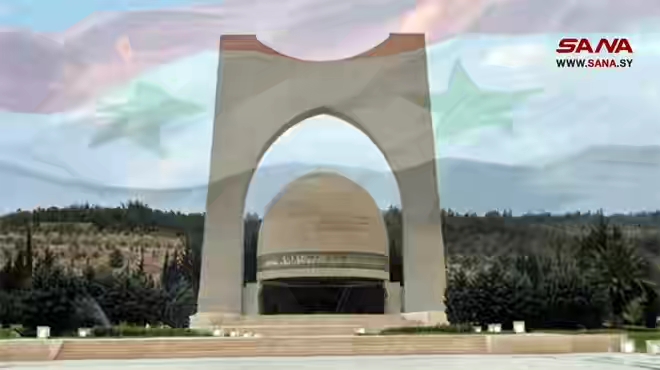As the Syrian people commemorate Martyrs’ Day, they remember with great pride the sacrifices offered by their fathers and forefathers who paid with their lives to defend their homeland and people against the Ottoman occupation of the Arab homeland. This day commemorates the hanging of prominent intellectual, political and cultural figures in Damascus and Beirut at the hands of Ottoman despot Jamal Pasha, who attempted to suppress the fire of revolution and freedom in Syrians. Just like Jamal Pasha set up gallows for the intellectuals of Syria in the past, his grandson, Recep Tayeb Erdogan is supporting takfiri terrorists who came from different parts of the world to destroy Syria and assassinate scientists, religious figures, devastating places of worship, universities and infrastructure, continuing the dark and criminal legacy of Jamal Pasha.
The story of Martyrs Day dates back to the beginning of the 20th century when Arab political figures and intellectuals started speaking of Arab nationalism. The Arabs’ demands were of a reformist nature, limited in general to autonomy, use of Arabic in education, and changes in conscription in the Ottoman Empire in peacetime for Arab conscripts that allowed local service in the Ottoman army. The Arab calls for independence reached peak with the holding of Arab Conference in Paris, 1913 under the leadership of intellectual Abdul Hamid al-Zahrawi. They produced a set of demands for greater autonomy within the Ottoman Empire. However, the Ottoman authorities launched a wide scale arrest campaign against Arab intellectuals and people turning a blind eye and a deaf ear to the Arab legitimate demands.
On May 6, 1916, Jamal Pasha publicly executed twenty-one Arab intellectuals and politicians simultaneously in Damascus and Beirut for alleged anti-Ottoman activities. The date, May 6, is commemorated annually in both countries as Martyrs’ Day. Since then, Al-Marja Square began to be known as Martyrs Square in memory of martyrs who are the noblest of mankind and the most generous people. Jamal Pasha’s oppression did not force the Arab people to halt their unabated resistance to the Ottomans and they pressed ahead with their struggle until they forced the Ottomans out of their homeland ending a four-century occupation. However, the Arabs fell under a new conspiracy represented by the ill-famed Sykes-Picot Accord which divided the Arab countries between Britain and France as if they were their inheritance. Once again, the Arab people started a relentless struggle until they won independence.
Syria today is more determined to eradicate terrorism than ever . Syrian people take pride in the martyrdom of their sons because martyrdom is the only way to protect the dignity and unity of the homeland. Our martyrs, who offered their lives for the sake of their people and homeland, have been the torch guiding the way for successive generations to continue struggle against colonialist forces.
Martyrs Day is an occasion to renew our adherence to our homeland and unwavering principles in confrontation of all challenges and conspiracies. The convoys of glory that rose to the heights of the sons of the homeland in defense of its precious wealth continued after the defeat of the Ottomans and the evacuation of the French occupier from the land of the homeland in 1946 and embodied in the school of martyrdom and struggle whose pillars were laid by the founding leader Hafez al-Assad and in its context, the resistance that defeated the Israeli enemy entity in Lebanon arose 2000 AD, then 2006 AD, so Syria became a pivotal hub in the resistance front to confront the American-Zionist project in the region. This was followed by the Syrian people’s confrontation with the aggressive and terrorist war against their country, through which they drew the path to victory with the blood of the martyrs and the sacrifices of our valiant army and the steadfastness of our people under the leadership Mr. President Bashar al-Assad.
K.Q.

